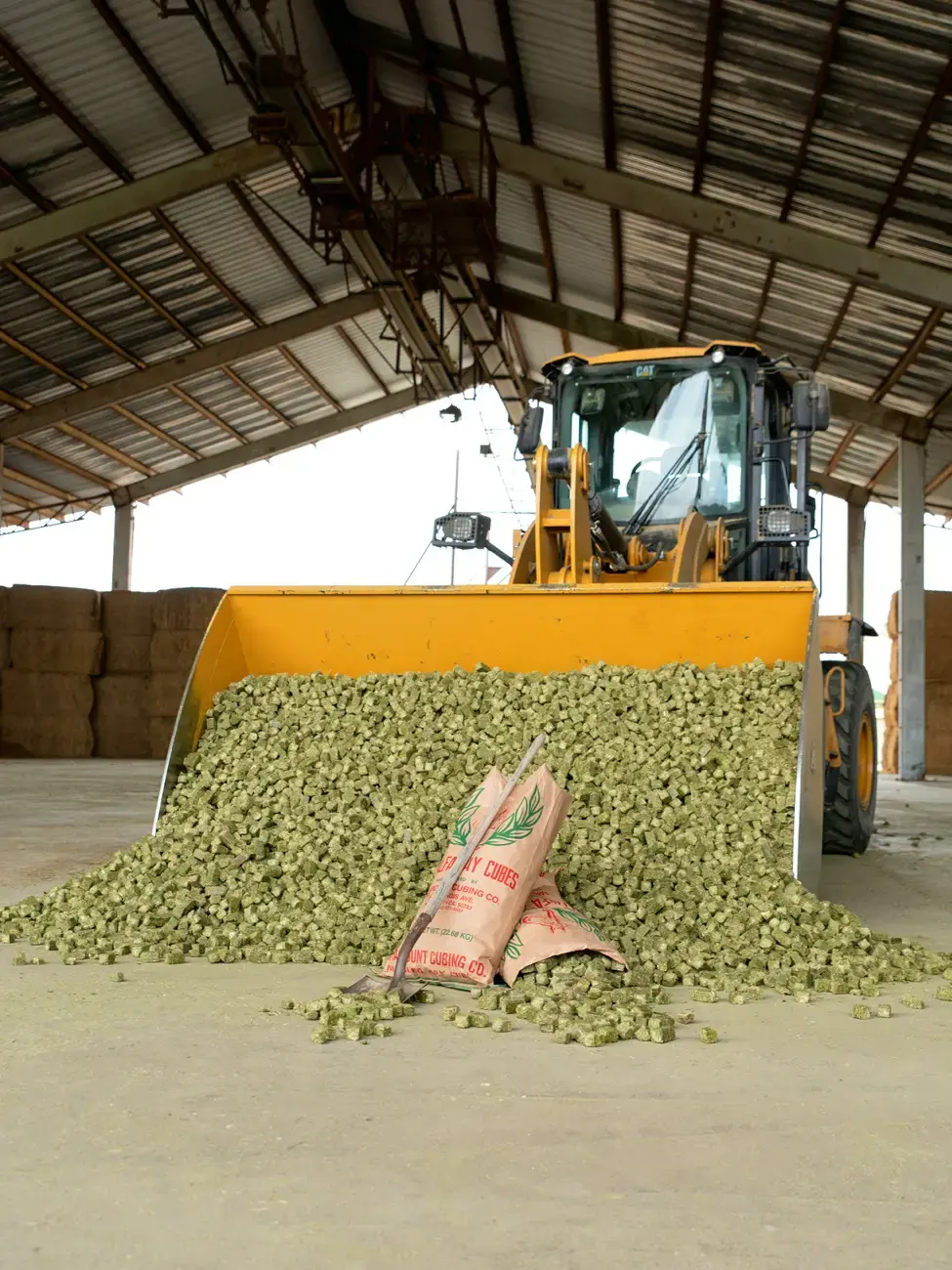Hay Cube Benefits for Older Horses
- McKenna Hines
- Aug 12, 2025
- 7 min read

Why Senior Horses Need Specialized Nutrition
As horses age, their dietary needs change significantly. Mad Barn says, “The exact age that classifies a horse as “senior” can vary depending on a multitude of factors such as the horse’s environment, genetics, nutrition and health history over their lifetime.”
Older horses often experience dental issues, slower digestion, and a decrease in nutrient absorption—all of which require special dietary attention.
This is where the hay cube comes in. It offers a consistent, easy-to-chew alternative to traditional hay, making it perfect for horses with worn teeth or missing molars.
Unlike long-stem hay, a hay cube is compressed and often easier for older horses to digest, especially when soaked in water to create a mash-like texture.
Feeding hay cubes helps ensure your senior horse gets the fiber it needs without struggling to chew or swallow, reducing the risk of choking and colic.
As a result, integrating a hay cube into a senior horse’s diet can greatly improve their comfort, nutrient intake, and overall quality of life.
Dental-Friendly Feeding Option
Tooth loss is common in older horses and can seriously affect their ability to chew traditional forage. This makes mealtime stressful and often ineffective.
A hay cube provides a softer alternative that reduces wear and strain on the teeth, especially when soaked to make it even easier to consume.
By replacing traditional long-stem hay with a hay cube, owners can ensure their horses get the necessary fiber without risking pain or food rejection.
The uniform texture of hay cubes also promotes consistent feeding and minimizes the chances of selective eating, which can cause nutritional imbalance.
Incorporating a hay cube into your older horse’s routine can help maintain healthy weight, reduce feed waste, and make daily meals more enjoyable.
Controlled Nutrition for Better Health
Senior horses often need more controlled diets to manage conditions like Cushing’s disease, arthritis, or metabolic disorders.

Using a hay cube allows owners to measure out precise amounts of forage and nutrients, creating a more consistent feeding regimen.
Unlike baled hay, which varies in quality and nutrient content, a high-quality hay cube is processed for uniformity and can include added vitamins or minerals.
This level of control is especially helpful for senior horses with specific dietary needs or those requiring close weight monitoring.
By feeding a hay cube, you not only simplify portion control but also ensure your horse is getting balanced nutrition in every bite.
Improved Digestibility and Fiber Intake
Older horses may struggle with sluggish digestion and reduced gut efficiency, especially when consuming coarse, stemmy hay.
A hay cube, made from chopped and compressed forage, breaks down more easily in the digestive tract, promoting better fiber absorption.
The moisture added when soaking cubes also helps support hydration, another important factor in senior horse health, especially in the hot Utah climate.
Because a hay cube is pre-processed, it’s typically free of large, indigestible stems and is easier on sensitive digestive systems.
Regular use of a hay cube can improve stool quality, reduce the risk of impaction, and support healthy gut flora in aging horses.
Weight Management Support
Maintaining healthy weight in older horses can be challenging due to metabolic slowdown, reduced appetite, or difficulty chewing.
A hay cube offers a calorie-dense, easy-to-chew feed option that supports gradual weight gain or maintenance without overfeeding grain.
Since a hay cube can be portioned and softened, it’s more palatable for picky eaters and can be blended with other feeds or supplements.
Additionally, the consistency in quality helps reduce feed waste and ensures your horse gets the intended caloric value in each feeding.
Incorporating a hay cube into a feeding program provides a reliable tool for managing weight while protecting overall health.
For additional tips on equine weight management, check out “Diet, Strategies, and Management Tips for Overweight Horses” from SmartEquine.
Convenience and Storage Benefits
For caregivers, ease of use is a major advantage of feeding hay cubes. They are easy to store, transport, and measure.

A hay cube takes up less space than traditional hay bales and doesn’t leave behind a mess of chaff, stems, or dust.
Especially in colder months, soaking a hay cube creates a warm, comforting mash for horses that may be reluctant to eat dry forage.
This convenience also benefits barn staff or boarding facilities who may manage multiple older horses with unique dietary needs.
By switching to a hay cube, caretakers save time and reduce cleanup while still delivering high-quality nutrition to senior horses.
Consistency in Every Feeding
A key benefit of feeding a hay cube is product consistency. Unlike baled hay that varies in quality from flake to flake, cubes are uniform in texture, weight, and nutrient density.
This consistency helps older horses maintain balanced digestion and reduces the risk of dietary upset, especially for those with sensitive stomachs.
Each hay cube contains a predictable ratio of fiber and protein, offering peace of mind to owners concerned with managing chronic health issues.
Because cubes are made from chopped, compressed forage, every portion you feed delivers the same reliable nutrition.
When you choose a hay cube over loose hay, you’re choosing consistency that supports better long-term health and daily feeding efficiency.
Reduction of Dust and Allergens
Many senior horses develop respiratory sensitivities with age, and dusty hay can trigger coughing, heaves, or nasal discharge.
A high-quality hay cube significantly reduces airborne particles compared to traditional dry hay, especially when soaked before feeding.
Minimizing dust not only benefits your horse but also improves air quality in the barn for handlers and caretakers.
When using a hay cube, you eliminate the mold spores and chaff often found in baled forage, reducing the chance of respiratory flare-ups.
If your horse has shown signs of respiratory distress, switching to a hay cube may provide immediate and noticeable relief.
Excellent Option During Hay Shortages
Hay shortages due to drought, wildfires, or transportation issues can make it hard to find consistent, high-quality forage for older horses.
A hay cube is a shelf-stable solution that can be stored in bulk and used as a full or partial replacement for baled hay.
Because a hay cube is compact and easier to transport, it’s more accessible when traditional hay becomes expensive or scarce.
In emergencies or off-seasons, keeping hay cube stock on hand ensures your senior horse never goes without fiber or nutrients.
Many equine nutritionists recommend having a backup supply of cubes as part of a smart, long-term feed plan.
Better Hydration Support
Senior horses may be less inclined to drink enough water, especially in colder months, leading to dehydration or impaction colic.

Soaking a hay cube encourages hydration by increasing water intake through meals, particularly beneficial during winter.
Hydrated cubes are also easier to chew and swallow, reducing the risk of choke—a condition that older horses are more prone to.
You can soak a hay cube in warm water during the cold season to encourage feeding and comfort, or in cool water during summer to refresh and hydrate.
Adding a hay cube mash to the diet is a smart, multi-purpose solution for both hydration and nutrition.
Flexible Feeding Methods
One of the advantages of using a hay cube is its versatility. You can feed it dry, soaked, or as part of a mash mixed with other feeds.
This flexibility allows owners to cater to their horse’s preferences and medical needs—ideal for senior horses on specialized regimens.
A hay cube can also be easily portioned into meals throughout the day, helping horses who benefit from smaller, more frequent feeding.
Whether you're traveling, stabling, or trailering, hay cube meals are easy to transport and prep, even on the go.
Feeding becomes more adaptable, ensuring that older horses eat well no matter the situation.
Less Waste, Cleaner Stalls
Traditional hay can be messy. Horses often trample it, pick through it, or leave it scattered around the stall—leading to significant feed waste.
With a hay cube, you can serve precisely the amount your horse needs, minimizing spillage and cleanup time.
Because a hay cube doesn’t fall apart like loose flakes, it stays intact in buckets or feeders, reducing contamination from manure or bedding.
This cleaner feeding method promotes hygiene, reduces fly problems, and helps you monitor exactly how much your horse is eating.
By switching to a hay cube, you’re making your barn more efficient and your feeding system more economical.
Balanced Protein and Fiber Levels
Older horses need a fine balance between protein for muscle maintenance and fiber for digestive health.

A well-formulated hay cube delivers the optimal combination of these two nutrients, especially when made from high-quality alfalfa or grass blends.
This nutritional balance supports muscle tone, healthy skin and coat, and steady energy without overloading the digestive system.
Regular use of a hay cube helps meet these requirements without needing multiple feed supplements or complex formulas.
For aging horses struggling with weight loss or lack of energy, a protein-rich hay cube can make a visible difference.
Easy Integration Into Existing Diets
You don’t need to completely overhaul your horse’s diet to benefit from hay cubes. A hay cube can be gradually introduced alongside current feed routines.
Start by replacing one flake of hay with an equal amount of cubes, and monitor your horse’s response.
Because a hay cube is palatable and easy to chew, many horses accept the change without issue, especially if soaked and flavored.
You can also use cubes as a carrier for supplements, creating a mash that’s more enjoyable than dry grain or powders.
Adding a hay cube to your senior horse’s diet is a smooth, low-stress transition that often brings noticeable improvements.
Cost-Effective Long-Term Solution
Though some owners see cubes as more expensive per pound than hay, a hay cube often leads to less waste, fewer supplements, and better feed utilization.
Over time, this can translate into savings on vet bills, feed additives, and hay that ends up spoiled or ignored.
A hay cube also stores better, keeping its quality longer and reducing the need for frequent resupply—especially beneficial during unpredictable seasons.
For aging horses with specific dietary needs, hay cubes offer targeted nutrition without added processing or artificial fillers.
In the long run, choosing a hay cube for your older horse may be one of the most cost-effective and health-forward decisions you can make.
Choose Hay Cubes to Support Your Senior Horse’s Health
Feeding senior horses is both an art and a science, and hay cubes offer the perfect balance of convenience, digestibility, and nutrition. From helping with dental issues to supporting hydration and digestive health, a hay cube is a powerful ally in your horse's golden years.

Whether your goal is weight maintenance, improved digestion, or easier chewing, switching to a hay cube can make a world of difference. It's a simple, effective solution trusted by horse owners and veterinarians alike.
To ensure your aging horse gets the very best, choose high-quality hay cubes from local sources that prioritize freshness and forage integrity.
Support local. Shop premium hay cubes from trusted Utah ranchers like Rockin Rafter Ranch and give your senior horse the nourishment it deserves.
Browse the full feed selection on our website.




Comments